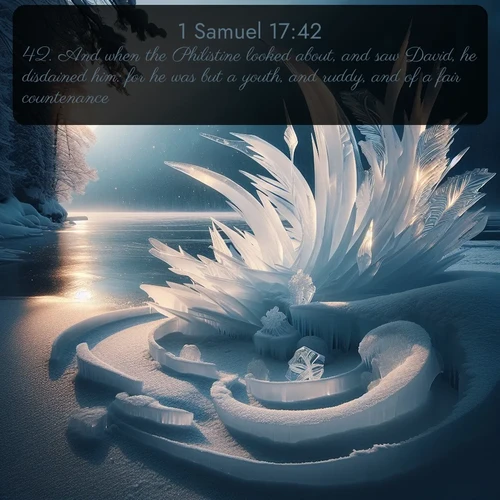1 Samuel 17:42 plusieurs versions / traductions
English Bible Translations
42. And when the Philistine looked about, and saw David, he disdained him: for he was but a youth, and ruddy, and of a fair countenance.
42. And when the Philistine looked about, and saw David, he disdained him; for he was but a youth, and ruddy, and withal of a fair countenance.
42. And when the Philistine, taking note, saw David, he had a poor opinion of him: for he was only a boy, red-haired and good-looking.
42. And when the Philistine looked about and saw David, he disdained him; for he was a youth, and ruddy, and besides of a beautiful countenance.
42. And when the Philistine looked about, and saw David, he disdained him: for he was a youth, and ruddy, and of a fair countenance.
42. and the Philistine looketh attentively, and seeth David, and despiseth him, for he was a youth, and ruddy, with a fair appearance.
German Bible Translations
42. Da nun der Philister sah und schaute David an, verachtete er ihn; denn er war ein Knabe, bräunlich und schön. {~}
42. Als nun der Philister den David sah und beschaute, verachtete er ihn; denn er war ein Knabe, bräunlich und von schöner Gestalt.
French Bible Translations
42. Le Philistin regarda David et, lorsqu'il l'aperçut, il le méprisa, car il ne vit en lui qu'un enfant roux à la belle apparence.
42. Le Philistin regarda, et lorsqu’il aperçut David, il le méprisa, ne voyant en lui qu’un enfant, blond et d’une belle figure.
42. Le Philistin regarda, et lorsqu'il aperçut David, il le méprisa, ne voyant en lui qu'un enfant, blond et d'une belle figure.
42. Et le Philistin regarda et vit David, et le méprisa; car c'était un jeune homme au teint rosé, et beau de visage.
42. Et le Philistin regarda, et vit David, et le méprisa; car ce n'était qu'un jeune garçon, blond, et beau de visage.
42. Alors le Philistin regarda, et vit David, et le méprisa; car c'était un jeune homme, blond et beau de visage.
Versions with Strong Codes
1 Samuel 17 / KJV_Strong42. And when the Philistine[H6430] looked about,[H5027] and saw[H7200] [H853] David,[H1732] he disdained[H959] him: for[H3588] he was[H1961] but a youth,[H5288] and ruddy,[H132] and of[H5973] a fair[H3303] countenance.[H4758]
Strong Code definitions
H6430 Plishtiy pel-ish-tee' patrial from H6429; a Pelishtite or inhabitant of Pelesheth:--Philistine.see H6429
H5027 nabat naw-bat' a primitive root; to scan, i.e. look intently at; by implication, to regard with pleasure, favor or care:--(cause to) behold, consider, look (down), regard, have respect, see.
H7200 ra'ah raw-aw' a primitive root; to see, literally or figuratively (in numerous applications, direct and implied, transitive, intransitive and causative):--advise self, appear, approve, behold, X certainly, consider, discern, (make to) enjoy, have experience, gaze, take heed, X indeed, X joyfully, lo, look (on, one another, one on another, one upon another, out, up, upon), mark, meet, X be near, perceive, present, provide, regard, (have) respect, (fore-, cause to, let) see(-r, -m, one another), shew (self), X sight of others, (e-)spy, stare, X surely, X think, view, visions.
H853 'eth ayth apparent contracted from H226 in the demonstrative sense of entity; properly, self (but generally used to point out more definitely the object of a verb or preposition, even or namely):--(as such unrepresented in English). see H226
H1732 David daw-veed' rarely (fully); Daviyd {daw-veed'}; from the same as H1730; loving; David, the youngest son of Jesse:--David.see H1730
H959 bazah baw-zaw' a primitive root; to disesteem:--despise, disdain, contemn(-ptible), + think to scorn, vile person.
H3588 kiy kee a primitive particle (the full form of the prepositional prefix) indicating causal relations of all kinds, antecedentor consequent; (by implication) very widely used as a relative conjunction or adverb (as below); often largely modified by other particles annexed:--and, + (forasmuch, inasmuch, where-)as, assured(-ly), + but, certainly, doubtless, + else, even, + except, for, how, (because, in, so, than) that, + nevertheless, now, rightly, seeing, since, surely, then, therefore, + (al- )though, + till, truly, + until, when,whether, while, whom, yea, yet.
H1961 hayah haw-yaw a primitive root (compare 1933); to exist, i.e. be or become, come to pass (always emphatic, and not a mere copula or auxiliary):--beacon, X altogether, be(-come), accomplished, committed, like), break, cause, come (to pass), do, faint, fall, + follow, happen, X have, last, pertain, quit(one-)self, require, X use. see H1933
H5288 na`ar nah'-ar from H5287; (concretely) a boy (as active), from the age of infancy to adolescence; by implication, a servant; also (by interch. of sex), a girl (of similar latitude in age):--babe, boy, child, damsel (from the margin), lad, servant, young (man).see H5287
H132 'admoniy ad-mo-nee' or (fully) admowniy {ad-mo-nee'}; from H119; reddish (of the hair or the complexion):--red, ruddy. see H119
H5973 `im eem from H6004; adverb or preposition, with (i.e. in conjunction with), in varied applications; specifically, equally with; often with prepositional prefix (and then usuallyunrepresented in English):--accompanying, against, and, as (X long as), before, beside, by (reason of), for all, from(among, between), in, like, more than, of, (un-)to, with(-al).see H6004
H3303 yapheh yaw-feh' from H3302; beautiful (literally or figuratively):--+ beautiful, beauty, comely, fair(-est, one), + goodly, pleasant, well.see H3302
H4758 mar'eh mar-eh' from H7200; a view (the act of seeing); also an appearance (the thing seen), whether (real) a shape (especially if handsome, comeliness; often plural the looks), or (mental) a vision:--X apparently, appearance(-reth), X as soon as beautiful(-ly), countenance, fair, favoured, form, goodly, to look (up) on (to), look(-eth), pattern, to see, seem, sight, visage, vision.see H7200
Prédications qui analysent les thèmes 1 Samuel 17
Thèmes : David et Goliath; Victoire de DavidRelated Sermons discussing 1 Samuel 17
Themes : David et Goliath; Victoire de Davidsee also: Bible Key Verses ; KJV Bible Images, BBE Bible images

